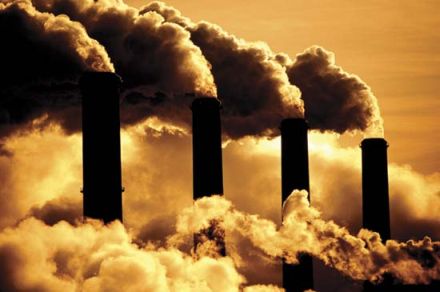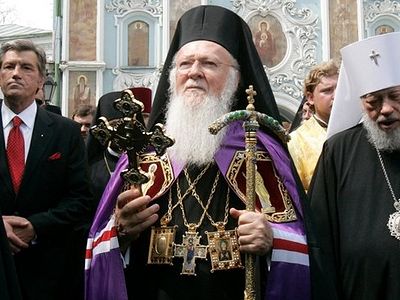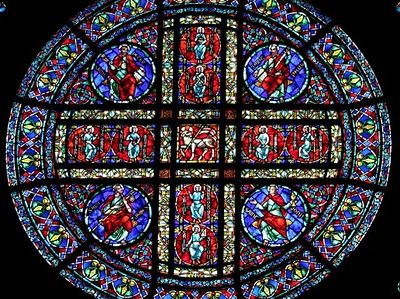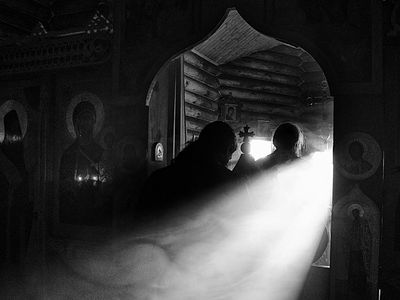
As he has done in the past, Ecumenical Patriarch Bartholomew in his encyclical for the beginning of the Orthodox Christian ecclesiastical year (September 1) meditates on “the ongoing and daily destruction of the natural environment.” Environmental damage is the poisoned fruit of “human greed” and the pursuit of “vain profit,” the patriarch writes. Given our place in creation, human sinfulness results in not only a dissonance within the human heart but also a “turbulence in nature,” fracturing as it does nature’s “crown, namely human existence.” Fallen out of love with God, Bartholomew continues, human existence is fractured, our physical survival is threatened. So profound is our estrangement from nature and nature’s God, that we risk His “imminent wrath.”
Bartholomew goes on to say Christians and all people of good will must cultivate a “continued vigilance, consciousness and mobilization of their resources in order to return to the state that reflects – if not the absolute Eucharistic and doxological condition of Adam and Eve – at least the condition inspired by God’s grace and mercy.” What is not as clear is how the Church’s vision is to be translated into practical personal action and effective public policies on the local, national, and international levels. As the Orthodox scholars Fr. Michael Butler and Professor Andrew Morriss remind us, “progress in solving environmental problems” will not “come about in response to naïve invocations of Orthodox Tradition.”
What Bartholomew leaves out of his analysis are the positive effects of the free market in solving environmental problems in Europe, Australia, and North America in the last 50 or so years. This is also likely to be the case in Asia, Africa, and South America, if markets in these countries are allowed to grow and create wealth there as well. While the marketplace too is marred by human sinfulness, people using their talents there have been able to create the wealth that has contributed mightily to the “fruitful and noteworthy activities” undertaken to clean the air and water on which all life depends. And this wealth is not merely financial but technological and, most importantly, social. In this sense, it is emphatically not “vain profit.”
The encyclical’s argument would be strengthened if, as Butler and Morriss observe, it took into consideration the findings of economics, political science, and other disciplines about “how actions play out in the context of the natural world and human institutions.” Bartholomew’s oversight in the present context isn’t fatal to his argument. He hasn’t written a government white paper in defense of a particular policy position. Instead he was written a pastoral document meant to teach and inspire a deeper reflection that will, in time, lead to prayerful action on the personal or communal level.
Living in a culture that is increasingly hostile to a Christian understanding of the ethical and spiritual dimension of the ecological crisis, as Bartholomew puts it, reminds us not to minimize human “sinfulness and greed.” That’s important. So too is his observation that the “antidote” to the destruction of the natural environment is found in the Church’s liturgical and ascetical tradition. It is out of this tradition he is speaking when he says that the solution to the unjust exploitation of the natural resources of creation and “the destruction of the natural” is only to be found through “the indwelling of the Holy Spirit,” who not only deifies humankind but unites us with the natural environment in a way that enables us to see the whole Creation “as part of our very selves and respect it as something sacred without deviating toward abuses and extremes.”
What keeps this (and similar language in the encyclical) from degenerating into sentimentality is Bartholomew’s insistence that Orthodox Christian participation in the environmental movement be undertaken in fidelity to “Eucharistic obligations.” Yes, public education has helped in raising awareness about environmental issues and has contributed to significant progress in recent decades to protecting the environment. And yes, well-crafted laws and regulations (“precautionary and restrictive measures”) as well as private and public efforts to create “sustainable programs” and ascetical self-restraint (“returning to more moderate energy sources”) have also played a role in bringing about a cleaner environment and a more just – to say nothing of efficient – use of resources. But the uniquely Orthodox contribution is found not in any of these or similar things but in our celebration of the Eucharist -- in our “offering its holy gifts to their Creator in the mystery of salvation.”
As an Orthodox Christian, my offering of creation back to God presupposes human creativity and ingenuity. In the Eucharist the things of this earth are first shaped by human and hands and only then offered to God. As one early Eucharistic prayer puts it:
Even as this broken bread was scattered over the hills, and was gathered together and became one, so let your church be gathered together from the ends of the earth into your kingdom. To you is the glory and the power through Jesus Christ forever. (Didache, 9:4)
The Eucharistic and doxological consciousness at the heart of Orthodox spirituality and ecclesial life doesn’t preclude human creativity and industry but presupposes and requires it.
Beyond the practical matter of its ability to create wealth – that is, to shape creation in a way that fosters human flourishing – the free market is also consonant with the Church’s Eucharistic anthropology. Two points of convergence come to mind.
First, the market and the Eucharist both presuppose and require human creativity. The human activity clears the field, plants seed, harvests and threshes wheat, mills the flour, and bakes the bread that in turn serves both to nourish the body at the family table and glorify God at the altar.
Second, cooperation is key both to a well-functioning market and the celebration of the Eucharist. And the cooperation transcends the immediate social context not only of the specific exchange but also of the Divine Liturgy. In both cases, what is done depends on the cooperation of myriad individuals, most of whom I will never meet. The truck driver who delivers bread to my local grocery store and the driver who delivers the flour I will use to bake bread for the Eucharist both contribute to my material and spiritual well-being.
Let me suggest that our participation in a market economy is compatible with our celebration of the Eucharist. This isn’t to suggest that somehow the market fulfils the Eucharist; it doesn’t. Instead I’m making a humbler argument that, within the boundaries of the Christian moral tradition, our economic activity in the marketplace can be faithful to the Eucharist we celebrate on Sunday morning. What is needed is not a new economic model but a deeper awareness of the Eucharistic roots of our economic life.
And what about the environment?
Let me suggest that if our participation in a market economy can be compatible with the Eucharist then we need not see the market as necessarily hostile to Orthodox Christian environmental concerns. In fact, I would even go so far as to say that market-based solutions to environmental problems can be not only economically and technically efficient but in agreement with the Eucharist.



